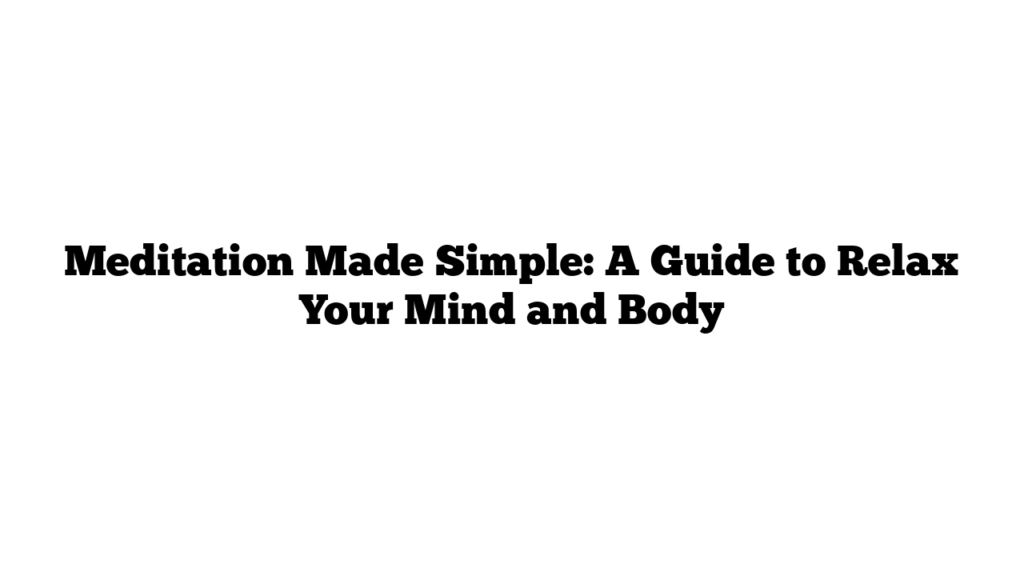Meditation has become an essential practice in today’s fast-paced world, offering a natural way to reduce stress, improve focus, and boost overall well-being. Whether you’re a beginner or looking to deepen your practice, this article will cover everything you need to know about meditation, its benefits, and how to start.

What is Meditation?
Meditation is the practice of focusing your mind to achieve a state of relaxation, clarity, and awareness. It’s been used for centuries across cultures and religions, but in modern times, it’s celebrated as a powerful tool for mental health and personal growth.
Benefits of Meditation
Meditation isn’t just for yogis or monks—it’s for everyone! Here are some key benefits:
- Reduces Stress: Meditation lowers cortisol levels, helping you feel calm.
- Improves Focus: Regular practice enhances concentration and memory.
- Enhances Emotional Health: It fosters positivity and helps manage anxiety.
- Promotes Better Sleep: Meditation can relax your mind for restful sleep.
- Supports Physical Health: It lowers blood pressure and boosts immunity.
“Meditation is the journey from sound to silence, from movement to stillness, and from a limited identity to unlimited space.” – Sri Sri Ravi Shankar.
Types of Meditation Practices
There are several forms of meditation, each suited to different needs. Here are the most popular:
1. Mindfulness Meditation
Focus on the present moment without judgment. This practice is widely used in the USA for managing stress.
2. Transcendental Meditation
Involves silently repeating a mantra to achieve a relaxed state. Studies in the USA show it helps lower blood pressure.
3. Guided Meditation
An instructor or app leads you through imagery and relaxation techniques. It’s perfect for beginners!
4. Loving-Kindness Meditation
Fosters compassion and kindness toward yourself and others.
5. Body Scan Meditation
Encourages awareness of physical sensations, releasing tension step by step.
How to Start Meditating: A Beginner’s Guide
Starting meditation might seem daunting, but it’s incredibly simple. Here’s a step-by-step guide:
- Choose a Quiet Space: Find a spot with minimal distractions.
- Set a Time Limit: Start with 5-10 minutes and gradually increase.
- Sit Comfortably: Sit on a chair or floor, keeping your back straight.
- Focus on Your Breath: Pay attention to your breathing pattern.
- Acknowledge Wandering Thoughts: Gently return to your breath when your mind drifts.
Remember, consistency matters more than duration. Even a few minutes daily can have a profound impact.
How Meditation Impacts Your Brain
Meditation literally changes the brain. Studies from institutions in the USA reveal that:
- Gray Matter Increases: Areas responsible for learning and memory grow.
- Reduced Amygdala Activity: The brain’s stress center becomes less active.
- Improved Connectivity: It enhances communication between different brain regions.
Best Times to Meditate
- Morning: Start your day with clarity and calm.
- Before Bed: Prepare your mind and body for better sleep.
- During Breaks: Use meditation for a quick midday reset.
Common Myths About Meditation
- “You Need to Clear Your Mind Completely”: Meditation is about observing thoughts, not erasing them.
- “It Takes Hours to Work”: Just a few minutes a day can make a difference.
- “Only Spiritual People Meditate”: Meditation is for everyone, regardless of belief systems.
How to Stay Consistent
Consistency is key, so here are tips to stay on track:
- Set a Schedule: Pick the same time daily for meditation.
- Use Apps: Apps like Calm and Headspace are popular in the USA.
- Join a Community: Meditating with others can keep you motivated.
For more tips, visit medicaltimes.io.
Reference Websites
- Mayo Clinic – Meditation Overview
- Headspace – Meditation for Beginners
- National Center for Complementary and Integrative Health – Meditation Benefits
Top 10 FAQs About Meditation
1. Can anyone meditate?
Yes, meditation is for all ages and abilities.
2. How long should I meditate daily?
Start with 5-10 minutes and gradually increase to 20-30 minutes.
3. Do I need special equipment to meditate?
No, just a quiet space and comfortable seating are enough.
4. Can meditation help with anxiety?
Yes, meditation is a proven method to reduce anxiety and promote calmness.
5. Is there a best time to meditate?
Morning or evening works best, but anytime is fine as long as you’re consistent.
6. How quickly can I see results?
Some benefits like stress reduction can be felt immediately, while others may take weeks.
7. Can children practice meditation?
Yes, guided meditations for kids are beneficial and widely practiced in the USA.
8. Do I have to sit cross-legged?
No, sitting on a chair or any comfortable position works.
9. Can meditation replace therapy?
No, but it can complement therapy and improve mental health.
10. Are there risks to meditation?
Meditation is generally safe, but people with severe trauma may benefit from guided practices initially.

